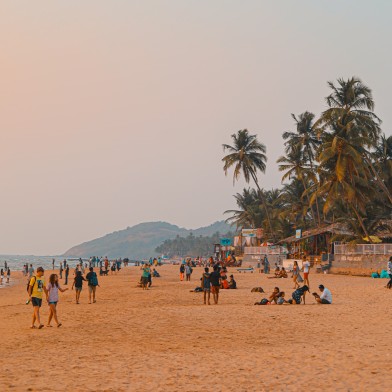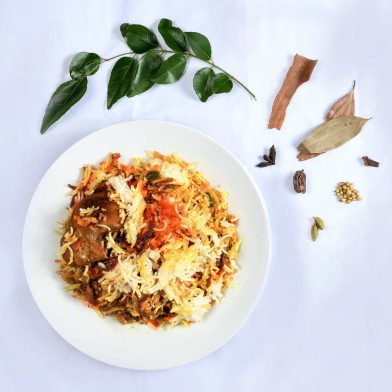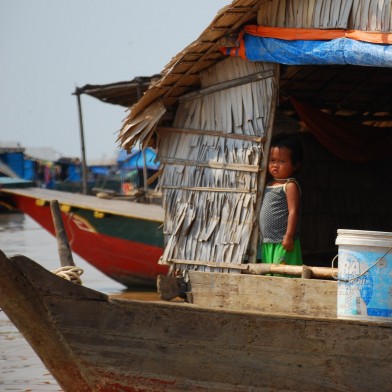Nestled in the heart of Srinagar, the summer capital of Jammu and Kashmir in India lays Dal Lake in all its glory. At first glance, the lake poses stunningly as a tourist attraction, drawing in visitors from far and wide. As you take a closer look, it reveals layers of intricate details and beauty.
The transformation of the Dal Lake begins as early as 4:00 AM. A blanket of mist falls upon the lake, and amongst the clouds of fog, boats loaded with fresh produce make their way to the floating vegetable market (locally known as Raad). Men wearing pherans (long fleece jackets) sit at the edge of the boat, seeking the eyes of the wholesale buyer who will secure the produce.
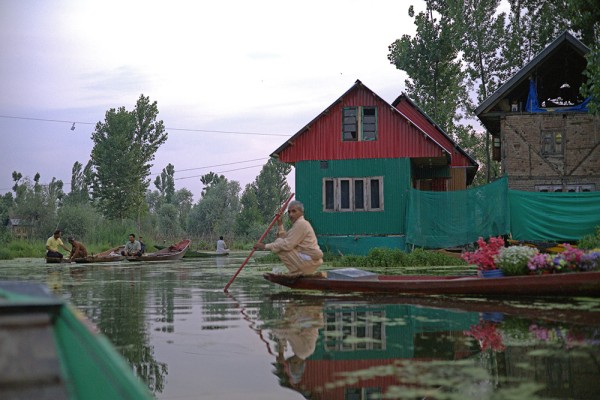
Lake Dal comes to life in the early morning, as vendors push their boats out into the waters. Image: Supplied/Nupur Kumari
Most of the vegetables sold in the market come from the lake itself. Spread across the lake are marsh farms that grow a variety of produce, Nadru (lotus stems) being the popular one. The locals use these stems to prepare an array of dishes like Nadru Yakhni (a yoghurt-based gravy), Nadru Monji (stems coated with spiced batter and fried) and Nadir Anchar (a spicy red pickle). Apart from the lotus stems, the daily harvest includes carrots, water chestnuts, bottle guards, turnips, kohlrabi and Haak (collard greens), to name a few. The fleeting spectacle lasts less than a couple of hours, with the market vanishing on sun break. The barter system still prevails on the lake, with the locals exchanging their abundant garden produce for an assortment of vegetables of their choice. The leftover produce from the market finds a second home in the bustling city markets.
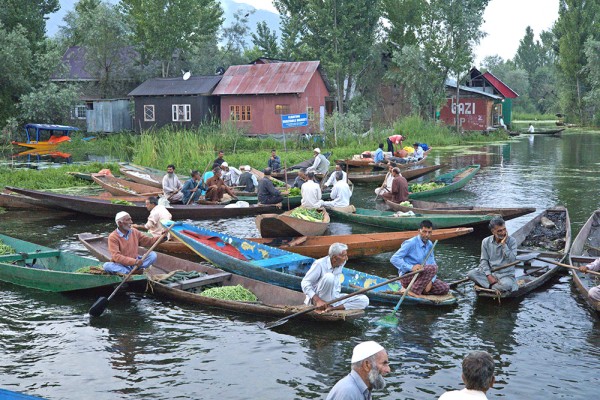
Produce from local marsh farms is sold in the market. Image: Supplied/Nupur Kumari
During the day, numerous houseboats anchored in the lakefront grab the attention of visitors who are after a unique stay. While the experience is popular, it comes with a fair share of problems, with water pollution being the top concern. Due to the lack of a proper sewage treatment system, the waste from the houseboats and the local residences poses a serious threat to the ecosystem housed by the lake. During the one-hour Shikara ride, the boatman let us in on the woes that have taken residence in his life. After hours of rowing the boat, he would only be left with a meagre 10% of what is charged to us. “The rest goes to the owner of the boat", he says. Due to a lack of strict labour laws, the workers are exploited and often must work long hours rowing the boat to make ends meet. According to Umeed Khan, our guide and lover of Sufi music, while the government has taken initiatives to manage the sewage problem and corruption, it has not been successful in fully mitigating the damage. The future of the lake looks grim with the blades of corruption and pollution looming over the ‘Jewel in the crown of Kashmir.’
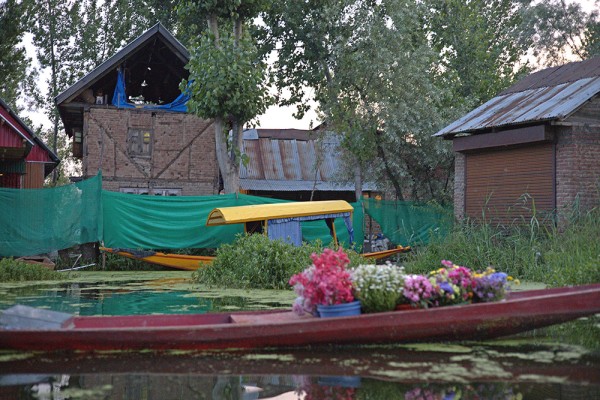
Pollution looms over the lake. Image: Supplied/Nupur Kumari
Anchored on the lakes is also Meena bazaar, a line of shops selling Pashmina shawls, rugs, Papier-mâché crafts, jewelry, clothes, and souvenirs, amongst other things. Outside the shops, the boatmen gather around and sip on the local Kahwa tea while the customers are getting their shopping fix inside. You will find Kahwa vendors in every nook and corner of Kashmir. Kahwa is unique to Kashmir, and each vendor will have their unique take on it. Cardamom pods, cinnamon, Kashmiri green tea leaves, cloves, dried rose petals, almonds, honey and saffron are the primary ingredients. Traditionally, the tea is brewed in a copper Samovar (tea urn) with heated charcoal. The steaming cup of Kahwa is elevated with the addition of local saffron and will have you coming back for more.
The lake isn’t just a spot for tourists and shop owners. Venture away from the commercial hub of the lake, and you will notice that it is also a permanent residence for many, with floating schools and houses for the locals. Instead of a car or a bike, the residents row their boats to commute. Along the narrow streams of the lake, you will find the locals dropping off their kids to the shore, fishing or picking vegetables from the marsh farms.
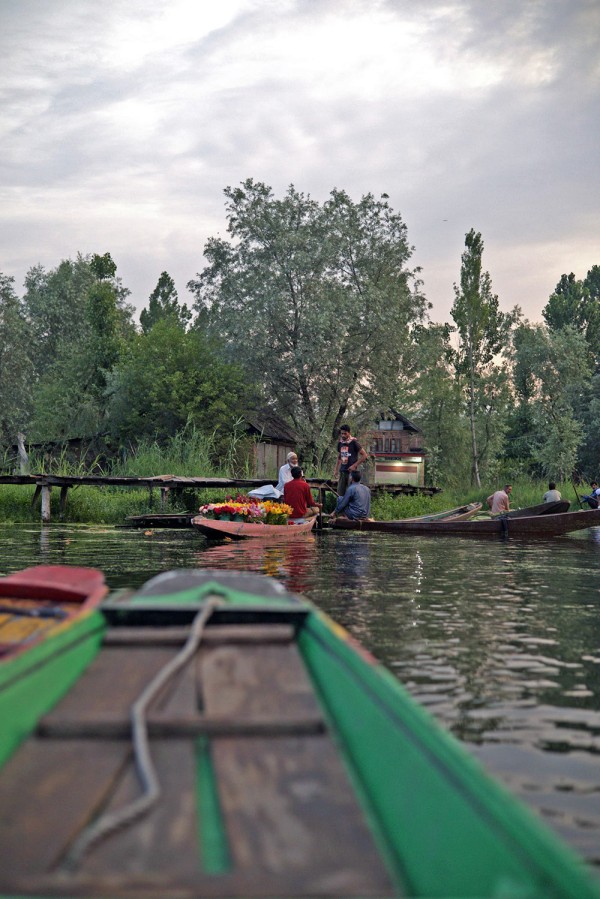
Image: Supplied/Nupur Kumari
For most people, a trip to Kashmir is incomplete without a Shikara (boat) ride. Colourful carpets and comfy cushions grace the deck, and bright ornaments of various shapes hang from the sides. With the snow-capped Pir Panjal mountain ranges in the backdrop, a ride in the Shikara is an indescribable experience. The duration of the Shikara rides can vary from 1 to 3 hours, depending on the spots you want to visit, with Shalimar Bagh, Hazratbal Shrine, Nishat Bagh, Meena Bazar, Floating gardens, Chaar Chinar, Sonn-laank, Nehru Park and Golden Lake being the most popular ones.
The most popular time to catch a ride is around sunset when the tranquility of the water meets the orange hues of the sky and a sense of serenity sets in. As the boat floats languorously through the waters, you hear echoes of chatter and laughter from other boats, while the boatmen highlight the popular spots around the lake. Water lilies, lotus, patches of seaweed, ducks and other birds float away blissfully. We grab the 10th cup of Kahwa for the day and sip away as we take in the beauty of the lake.
- Asia Media Centre
